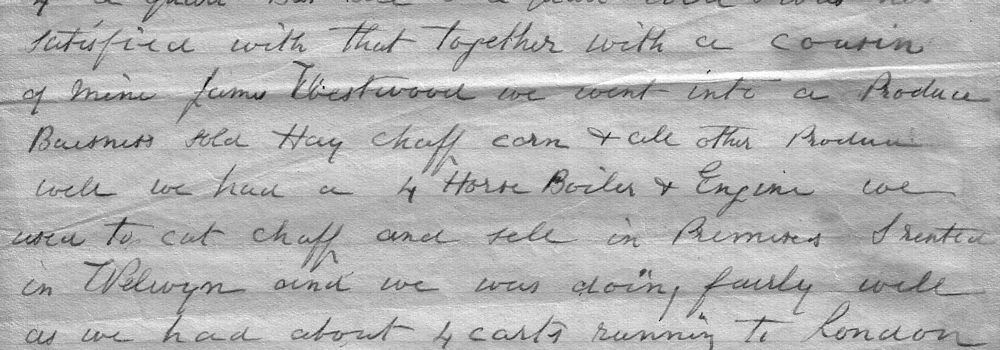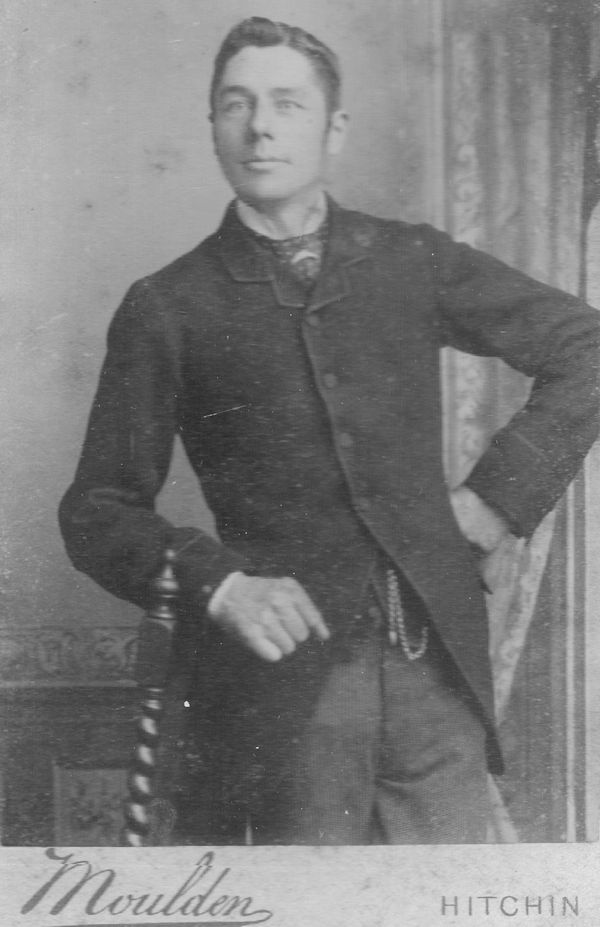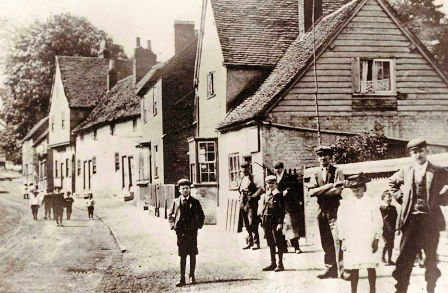
Henry Aldridge mentions starting a carrying business with his cousin James Westwood.
Hertfordshire village with Australian connection
In 1883, first cousins Henry Aldridge and James Westwood set up a carrying business in Hertfordshire, England, supplying mostly corn and chaff.

Studio image of Henry Aldridge’s first cousin James Westwood taken at Hitchin, Hertfordshire. See how the author relates to James Westwood.
Henry and his family had not long arrived back in his home country from Australia to where his father had emigrated in 1859.
Henry was 15 when he left Hertfordshire and would have known his younger cousin, James Westwood, as they both grew up in Welwyn.
When the Aldridge family left for Australia, the Westwoods (Henry’s Aunt Sarah’s family) had the Steam Engine pub in Welwyn. Sarah’s husband Thomas Westwood was a whitesmith and beer seller.
Their son, James Westwood, became a blacksmith and was well established in his business when his cousin came back to Hertfordshire.
It was a grand reunion on Wednesday, 18 April 1883, at Royal Albert Dock when Aldridge, Westwood and Phillips family members met their Australian cousins in London.
Of that day, Henry Aldridge wrote:
Well on the 18th of April we arrived in England after a voyage of 48 days when the wife’s mother and sisters met us at the Royal Albert Docks also my uncle Ted Aldridge and my aunt and cousins their names is Westwood.
Inheritance realised
Henry Aldridge had returned to Hertfordshire to take up an inheritance left him by his uncle Henry Aldridge, after whom he was named.
Obviously Henry and James soon struck up a lasting friendship as Henry expanded his business beyond being the landlord of the Black Horse Inn at Welwyn.
As he explained, he was not satisfied with running a pub:
Well I was not satisfied with that (so) together with a cousin of mine James Westwood we went into a produce business (we) sold chaff corn and all other produce.
The cousins used the technology of the day to cut and presumably bail the chaff. As well as their Welwyn clients, they were also sending several carts a day to feed London’s horses as Henry recalls:
Well we had a 4 horse power boiler and engine we used to cut chaff and sell in premises in Welwyn and we was doing fairly well as we had about 4 carts running to London…
Much in debt
But within 12 months three of the businesses they were supplying went broke and the cousins were likewise without income and left very much in debt.
Henry was forced in bankruptcy and, as he wrote, “after selling everything we had barely enough to pay our debts”.
I have written extensively of the ups and downs of Henry Aldridge’s life, but hereafter focus on his cousin James Westwood who continued on as a successful businessman after their failed venture.
Here’s where research can get very complicated and somewhat confusing because when James Westwood died in 1906, he was described as having been publican at the Two Brewers, Wheathampstead, for 32 years.

The 1901 census entry for James Westwood and family at the Two Brewers, Wheathampstead.
As well, he conducted his blacksmith business from the back of the premises.

Westwood family members outside the Two Brewers in 1906.
The census record reveals that between 1871 and 1881, James Westwood moved from The Steamer (previously known as the Steam Engine), Welwyn, about 10 miles to Wheathampstead.
However, even though the Westwood family is in the High Street, Wheathampstead, from 1881, the address is not described as the Two Brewers until 1901.
James Westwood was much involved in village life as was revealed when he caught pneumonia and passed away aged 56. The news was announced in the Herts Advertiser newspaper on 6 October 1906:
WHEATHAMPSTEAD: Death of Mr James Westwood.-Attributed to a chill contracted at the cricket match, Married v Single, on Thursday of last week, the death took place on Wednesday morning of Mr. James Westwood, publican, of the High-street. Mr Westwood was extremely popular with all villagers, and his sudden death from Pneumonia was received with widespread regret. For many years he was connected with the Volunteers and the local Fire Brigade.
There followed a grand funeral, a report of which began:
Fully eighty Volunteers, representing the F Company of the 1st Volunteer Battalion Beds Regiment, paid a last tribute to a life of comradeship on Monday afternoon, when they attended the funeral of the late Pioneer-Sergeant J.Westwood, at Wheathampstead, according to full military honours.
The esteem with which James Westwood was held is reflected in the following paragraph:
A village’s interest was aroused in the funeral of a highly-respected and valued inhabitant known by all, and only on few occasions has sympathy been so widespread and heartfelt.
Most of the report is taken up with references to his public service with the Volunteers as well as with the Wheathampstead Fire Brigade. Family members are mentioned, of course, which proves invaluable information on his genealogy. Those mentioned were:
The following were family mourners: Messrs. Harry, Tom, Lionel and Stanley Westwood (sons), Mr J.Westwood, Mr H.Westwood, and Mr W.Westwood (brothers), Mr E.Westwood, and Mr W.Gray (nephews), Mrs Coville [Colvil correct spelling] (sister), the Misses Nellie and Ada Westwood (daughters), Mr Alfred Izzard and Mr W.Izzard (cousins), Mrs T.Westwood (daughter-in-law), Mrs H. Westwood (sister-in-law), Mrs H. and Mrs W.Izzard, Mrs C.W.Bishop, and Mrs A.Mizem (cousins), Mr and Mrs F.Gray, Mr and Mrs E.Gray, and Mr and Mrs G.Gray (brothers and sisters-in-law), Mr H.Ward, and Mr W.Ward.
Violin teacher
While I can’t identify everyone listed, the most satisfying discovery was tracking James’s sister Sarah Anne.
She was first married to John Davenport in 1888 but he died in 1893 and she thereafter remarried (in 1895) to Alfred Ernest Colvil.
Tracking Sarah through the records reveals she was a specialist violin teacher in London known as Madame Annie Colvil.
Two Brewers
But back to the Westwood family and their blacksmith shop in Wheathampstead. After James died in 1906, his son Harry (Henry George Westwood) carried on the business and was widely known for his great craftsmanship.
Harry’s son Cecil (aka Jim) wrote about his dad’s achievements in 50 years at the anvil. A couple of points of interest include:
The Westwoods in 1913 made all the wrought iron work for the Church of St. Peters at Gustard Wood, and due to a last minute decision to have wrought iron altar rails, Harry worked for a fortnight almost to the point of exhaustion, in order to complete the work in time.
They also made the gates at Shaw’s Corner for Bernard Shaw. Alf is the proud possessor of two of Bernard Shaw’s famous short pertinent post cards.
Bernard Shaw is the controversial playwright; and the Alf mentioned is Harry’s son.
The Westwood family undoubtedly made a lasting impression on Wheathampstead down the generations.
The Wheathampstead History Society has produced a history of the Two Brewers that of course mentions the Westwood family.
*Warren Nunn is an Aldridge descendant.
